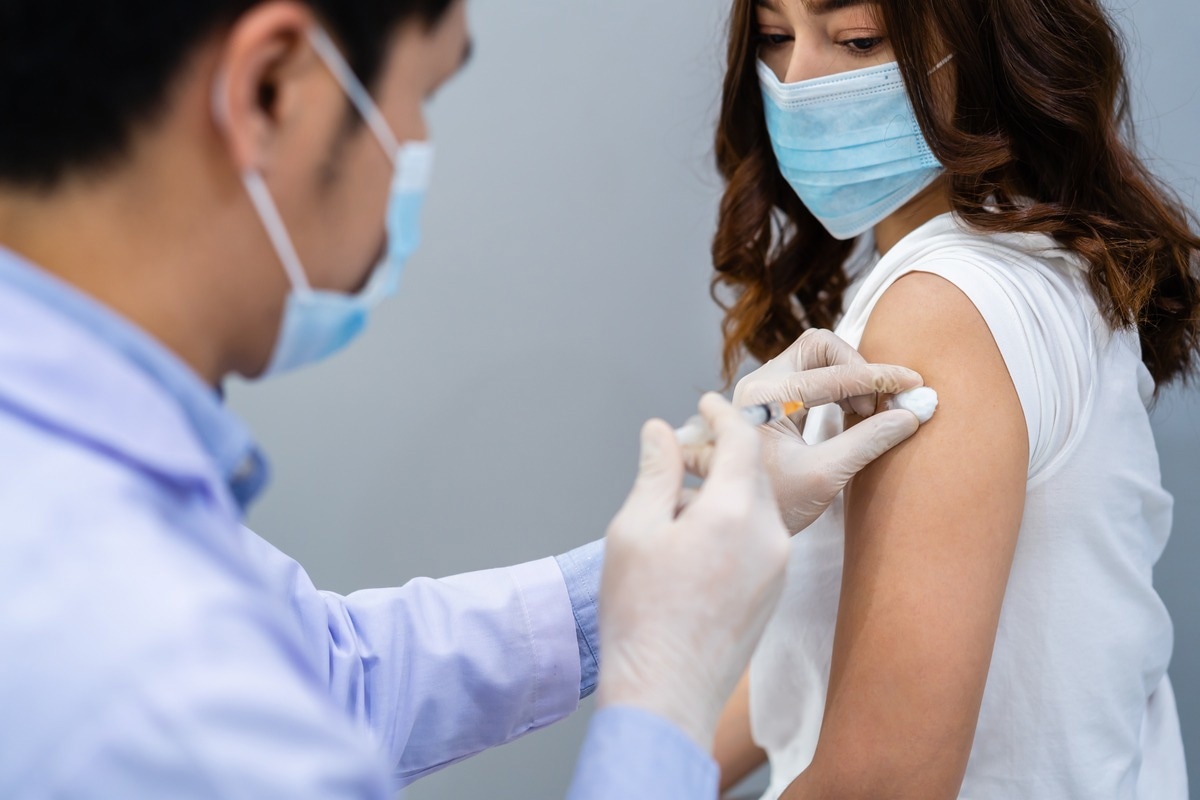In a recent study published in The New England Journal of Medicine, researchers assessed the efficacy of maternal messenger ribonucleic acid (mRNA) vaccinations during pregnancy against hospitalization for coronavirus disease 2019 (COVID-19) in infants aged <6 months.

Study: Maternal Vaccination and Risk of Hospitalization for Covid-19 among Infants. Image Credit: BaLL LunLa/Shutterstock
Background
Infants aged below six months are at an increased risk of severe acute respiratory syndrome coronavirus 2 (SARS-CoV-2) infection complications and are ineligible for receiving COVID-19 vaccines. Transplacental transfers of maternal anti-SARS-CoV-2 antibodies after SARS-CoV-2 vaccination of mothers could confer immune protection to their infants against SARS-CoV-2.
The authors of the present study previously reported that the risk of COVID-19-associated hospitalization was 61% lower among infants aged <6 months born to mothers who had received double (mRNA) vaccination during pregnancy when the SARS-CoV-2 Delta (B.1.617.2) variant was dominant.
About the study
In the present case-control study, researchers extended their previous analysis by exploring the protective role of mRNA vaccination of pregnant women against COVID-19-associated hospitalization in infants aged <6 months during the dominance of the SARS-CoV-2 Omicron (B.1.1.259) variant. Compared to their previous study, the present study comprised a much larger sample size, i.e., more 361 and 309 case infants and control infants, respectively.
The study was conducted between 1 July 2021 and 8 March 2022 and comprised infants with COVID-19-associated hospitalizations (case infants) and infants without COVID-19-associated hospitalizations (control infants) across 30 pediatric hospitals from 22 states. Case infants were identified using active ongoing surveillance data of the centers for disease control and prevention (CDC)- funded overcoming COVID-19 network.
Data were obtained on demographical parameters, prior COVID-19 history, and clinical findings of the existing illness via electronic medical records and by interviewing the parents (or guardians) of the infants. Maternal vaccination information such as dates of vaccination, doses received, whether the mothers were vaccinated during pregnancy dose, the site where mothers were vaccinated, vaccine manufacturers, and the COVID-19 vaccination card availability was obtained.
Data were also obtained for COVID-19-associated hospitalizations, intensive care unit (ICU) admissions, and critical COVID-19 cases requiring life-supporting interventions or leading to death. Life-supporting interventions included non-invasive mechanical ventilation (continuous or bilevel positive airway pressure), invasive mechanical ventilation, vasoactive infusions, and extracorporeal membrane oxygenation.
All case infants were diagnosed as SARS-CoV-2-positive by antigen testing or reverse transcription-polymerase chain reaction (RT-PCR) within ten days of symptom onset or three days of hospitalization. Mothers were considered fully vaccinated if they had received double doses of the mRNA-1273 or BNT162b2 mRNA vaccines.
Women who received the initial vaccine dose before pregnancy and the second vaccine dose post-pregnancy were included in the analysis. Since protective immunity is built after approximately two weeks of vaccination, case infants born to mothers vaccinated <14 days before delivery were excluded from the analysis.
In addition, infants born to mothers who had received triple mRNA vaccination (n = 29 infants) or were vaccinated with the Ad26.COV2.S non-mRNA vaccine (n = 13 infants) were excluded due to the small number of pregnant women in both these categories. Vaccine efficacy was estimated by comparing the odds of COVID-19 severity outcomes in both infant groups born to mothers fully vaccinated during pregnancy in the periods of Delta predominance (between 1 July 2021 and 18 December 2021) and Omicron predominance (between 19 December 2021 and 8 March 2022).
Results
The analysis was performed for 537 and 512 case infants and control infants, respectively. Among case infants, 181 infants were hospitalized with Delta infections, and 356 infants were hospitalized with Omicron infections. The mean age of the study participants was two months. About 16% and 29% of case infants and control infants, respectively, were born to women fully vaccinated during pregnancy.
In comparison to case infants born to mothers who were not fully vaccinated during pregnancy (n=450 infants), case infants born to women fully vaccinated during pregnancy (n=87 infants) demonstrated lower ICU admissions (23% versus 13%). In addition, case infants demonstrated lower critical SARS-CoV-2 infection (12% versus 9%), invasive mechanical ventilation requirements (7% versus 3%), non-invasive mechanical ventilation requirements (8% versus 6%), and vasoactive infusion requirements (3% versus 1%) compared to control infants.
Among case infants, 21% (n=113) were admitted to the ICU, of which 12% (n= 64) received vasoactive infusions or mechanical ventilation. The death of two case infants due to COVID-19 was reported, and two case infants required extracorporeal membrane oxygen supplementation, none of whose mothers received double mRNA vaccination while they were pregnant.
The efficacy of complete maternal mRNA vaccinations against COVID-19-associated hospitalization in infants was reported to be 52%, with 80% efficacy during Delta predominance and 38% efficacy during Omicron predominance. The efficacy was 70% against COVID-19-associated ICU admission and 47% against hospitalization not requiring ICU admission. Further, the efficacy was 38% and 69% when mothers were vaccinated during the initial 20 gestational weeks and post 20 gestational weeks, respectively.
Overall, the study findings showed that complete (double dose) maternal mRNA vaccination lowered the risk of COVID-19-associated hospitalizations among infants aged <6 months.